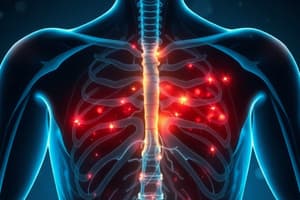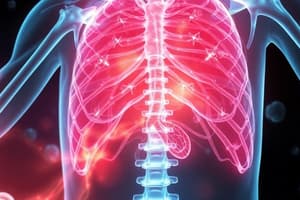Podcast
Questions and Answers
What percentage of hypercalcemia cases are caused by malignancy?
What percentage of hypercalcemia cases are caused by malignancy?
- 50%
- 100%
- 90% (correct)
- 80%
What is the normal range of plasma calcium concentration?
What is the normal range of plasma calcium concentration?
- 2.1-2.55 mmol/L (correct)
- 2.6-3.0 mmol/L
- 1.5-2.0 mmol/L
- 3.5-4.0 mmol/L
What is the mechanism by which PTHrP causes hypercalcemia?
What is the mechanism by which PTHrP causes hypercalcemia?
- By stimulating bone formation
- By inhibiting bone resorption
- By increasing bone resorption and decreasing calcium excretion (correct)
- By decreasing bone resorption and increasing calcium excretion
What is the term for the hypercalcemia caused by the production of PTHrP by some tumors?
What is the term for the hypercalcemia caused by the production of PTHrP by some tumors?
Which of the following is a cause of hypercalcemia not related to malignancy or parathyroid disorder?
Which of the following is a cause of hypercalcemia not related to malignancy or parathyroid disorder?
What is the term for the excessive production of parathyroid hormone?
What is the term for the excessive production of parathyroid hormone?
What is the name of the syndrome caused by the production of PTHrP by some tumors?
What is the name of the syndrome caused by the production of PTHrP by some tumors?
What is the name of the hormone produced by some tumors that causes hypercalcemia?
What is the name of the hormone produced by some tumors that causes hypercalcemia?
What is the cause of hypercalcemia in granulomatous diseases such as TB and sarcoidosis?
What is the cause of hypercalcemia in granulomatous diseases such as TB and sarcoidosis?
Which of the following is NOT a symptom of hypercalcemia?
Which of the following is NOT a symptom of hypercalcemia?
What is the primary function of parathyroid hormone regulation?
What is the primary function of parathyroid hormone regulation?
Which of the following is a complication of hyperphosphatemia?
Which of the following is a complication of hyperphosphatemia?
What is the diagnosis of primary hyperparathyroidism based on?
What is the diagnosis of primary hyperparathyroidism based on?
What is the typical presentation of tumour lysis syndrome?
What is the typical presentation of tumour lysis syndrome?
Which of the following is an example of paraneoplastic syndrome?
Which of the following is an example of paraneoplastic syndrome?
What is the normal range of plasma calcium concentration?
What is the normal range of plasma calcium concentration?
What is the primary stimulus for parathyroid hormone secretion?
What is the primary stimulus for parathyroid hormone secretion?
What is the primary function of the parathyroid hormone in calcium metabolism?
What is the primary function of the parathyroid hormone in calcium metabolism?
What is a common cause of hypercalcemia?
What is a common cause of hypercalcemia?
What is the term for the condition in which a tumor, usually in the lung or kidney, produces a substance that mimics the action of parathyroid hormone, leading to hypercalcemia?
What is the term for the condition in which a tumor, usually in the lung or kidney, produces a substance that mimics the action of parathyroid hormone, leading to hypercalcemia?
What is the diagnosis of hyperparathyroidism often based on?
What is the diagnosis of hyperparathyroidism often based on?
What is the term for the condition in which the parathyroid glands are underactive, leading to hypocalcemia?
What is the term for the condition in which the parathyroid glands are underactive, leading to hypocalcemia?
What is the primary function of the parathyroid glands?
What is the primary function of the parathyroid glands?
What is the term for the condition in which the parathyroid glands are overactive, leading to hypercalcemia?
What is the term for the condition in which the parathyroid glands are overactive, leading to hypercalcemia?
Study Notes
Calcium Homeostasis
- Net effect of restoration of plasma phosphate to normal levels is independent of calcium levels.
Hypercalcemia
- Definition: Plasma calcium concentration >2.6mmol/L (normal range: 2.1-2.55mmol/L).
- Causes:
- Malignancy (90% of cases)
- Hyperparathyroidism
- Others (not related to malignancy or parathyroid disorder)
- Pathogenesis of hypercalcemia in malignancy:
- Metastasis of solid tumor to the bone, leading to increased bone resorption and release of calcium into the blood.
- Production of PTHrP (PTH-related peptide) by some tumors, which acts like PTH and increases bone resorption and decreases calcium excretion in the urine.
- Examples of malignancy-related hypercalcemia:
- Solid neoplasm (carcinoma of breast, bone, bronchus, cervical, ovary, gut, kidneys)
- Hematological malignancy (Multiple myeloma, lymphoma, and leukemia)
Causes of Hypercalcemia
- Hyperparathyroidism:
- Primary hyperparathyroidism
- Tertiary hyperparathyroidism
- Multiple Endocrine Neoplasia (MEN)
- Others:
- Hyperalbuminemia (dehydration, venostasis)
- Increased calcium intake/absorption (excess vitamin D intake, milk-alkali syndrome)
- Increased bone resorption (thyrotoxicosis, prolonged bedridden)
- Increased renal reabsorption (thiazide diuretics)
- Chronic lithium therapy
- Granulomatous disease (TB, sarcoidosis)
Symptoms of Hypercalcemia
- General:
- Lethargy
- Muscle weakness
- Loss of weight
- Impaired consciousness
- Confusion
- Drowsiness
- Coma
- Behavioral changes
- Eyes:
- Corneal and vascular calcification
- CVS:
- Hypertension
- Cardiac arrhythmia
- Aortic or mitral valve calcifications
- GIT:
- Nausea
- Vomiting
- Constipation
- Peptic ulcer
- Acute pancreatitis
- Gallstones
- Renal:
- Polyuria
- Polydipsia
- Nephrolithiasis
- Bone:
- Bone pain due to fracture of weakened bones by osteoporosis
Investigations for Hypercalcemia
- Serum albumin
- Serum calcium
- Serum ALP
- Renal profile
- Thyroid function test (TFT)
- PTH levels
- Serum and urine electrophoresis
- Vitamin D levels
- Radioimaging: Skeletal survey
Hypocalcemia
- Definition: Plasma calcium concentration <1.52mmol/L (normal range: 0.74-1.52mmol/L).
- Etiologies:
- Haemolysed sample
- CKD
- Hypoparathyroidism
- Pseudohypoparathyroidism
- Vitamin D intoxication/excess
- Excessive intake of phosphate
- Increased tissue catabolism (hematological malignancy, post-chemotherapy)
- Acromegaly
Complications of Hyperphosphatemia
- Increased phosphate levels inhibit hydroxylation of calcidiol in the kidney, leading to decreased calcitriol production and hypocalcemia.
- Parathyroid diseases.
Studying That Suits You
Use AI to generate personalized quizzes and flashcards to suit your learning preferences.
Description
This quiz covers the definition and causes of hypercalcemia, a condition characterized by high plasma calcium concentration, as well as disorders of calcium homeostasis. Learn about the normal range of plasma calcium levels and the factors that contribute to hypercalcemia.




